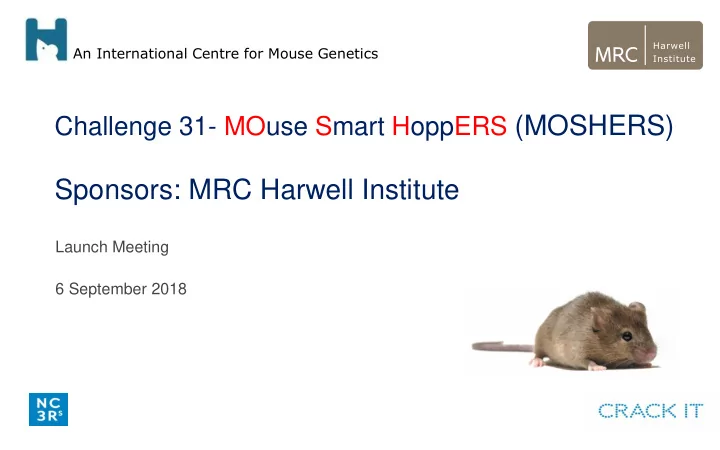

An International Centre for Mouse Genetics Challenge 31- MOuse Smart HoppERS (MOSHERS) Sponsors: MRC Harwell Institute Launch Meeting 6 September 2018
The Challenge To monitor and accurately measure food intake in a home cage - directly or indirectly Deliver individual data on three to five mice housed together
The Problem Monitoring food intake needs specialist equipment and space
The Problem 2 Behaviour changes when singly housed 4 *** *** 3 F o o d In ta k e (g) 2 1 0 F e m ale s M ale s Food intake using two separate metabolic cage-type monitoring systems (mutants in red)
The Problem 3 Monitoring food intake in home cages is labour- intensive and requires disturbing the animals every day 5 5 F o o d In ta k e /W e e k (g ) 5 0 *** Home cage food ** *** * *** 4 5 * *** intake 4 0 monitoring 3 5 3 0 2 5 4 5 6 7 8 9 1 0 1 1 1 2 1 3 1 4 1 5 1 6 1 7 1 8 A g e (W e e k s)
Otp- metabolic mutant ( Mol Metab 2017 6 (11) 1419) 5 5 F o o d In ta k e /W e e k (g ) 4 *** 5 0 *** ** *** *** * * *** 4 5 *** 3 F o o d In ta k e (g) 4 0 2 3 5 3 0 1 2 5 4 5 6 7 8 9 1 0 1 1 1 2 1 3 1 4 1 5 1 6 1 7 1 8 0 A g e (W e e k s) F e m ale s M ale s In this example, we expect that confounding factors such as neophobia and anxiety may be affecting the animal’s feeding behaviour
The Problem 4 Existing multiple housed systems are: a) too expensive for wide-spread use b) data-heavy requiring expertise and IT infrastructure c) require a modification inside/outside the cage
Current state of the art- Summary Weighing home cage hoppers Limited accuracy and sensitivity Averaged over mice in cage No account of hierarchy Specialised metabolic caging “Accurate” Single novel housing = stress = altered FI Home cage monitoring “Accurate” Not scalable for many cages
Why was this Challenge developed? Scientific - Food Intake (FI) in energy balance - Feeding behaviour - Obesity, diabetes, metabolic disease Business - Existing systems confounded by stress - Loss of metadata (when/how much/how long) - Lack of larger datasets
3Rs drivers Monitoring Welfare: • Weight loss is one of the most common welfare indicators used with mice • Mice are likely to reduce activity and feeding before weight loss • Opportunities for EARLY welfare indicators Early and accurate intervention: • Adjustment of analgesia routines • Detection of early onset indicators (e.g. neurodegenerative models) Innovations in Welfare: • NEW information on animal behaviour and feeding which may lead to refinements procedures such as fasting, post-surgical care and maintaining genetically altered mouse lines
Deliverables A DEVICE for everyone delivering a time series of data representing food intake. • Compatibility with all existing cages • Mouse friendly (no training or intervention) • Affordability • Accessibility – easy data analysis and Cloud potential • Portable and easy service • Collect data on individual cages (1) • Collect data on individual animals (2)
What we don’t want • Disruption of the home environment • Single housing • Difficult data analysis • Expensive to buy, run and maintain • Hard for technicians to operate in high throughput settings (set up/take down/clean) • Low-level adoption and non-standardisation of food-intake measurement.
Sponsor in-kind House 55k mice • 2017: • 197k regulated procedures 229k mice bred 133 new GA lines • In-house validation with wild type and mutant lines including a comparison of data from paired-feeding, metabolic and calorimetry caging data. • Advice and ideas in device design • In-house testing of a prototype device • Data critique and validation • Access to a wide network of mouse genetic researchers (inside and outside of Harwell) for advice/analysis and critique.
Contacts Dr Sara Wells: S.wells@har.mrc.ac.uk Dr Roger Cox: R.Cox@har.mrc.ac.uk
Recommend
More recommend